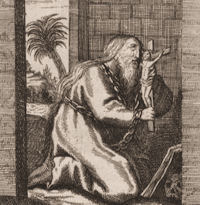Lent: February 28th
Thursday of the Third Week of Lent
Other Commemorations: St. Hilary, Pope (RM); St. Romanus of Condat, Abbot (RM); Bl. Daniel Brottier (RM)
» Enjoy our Liturgical Seasons series of e-books!
But he knew their thoughts and said to them, "Every kingdom divided against itself will be laid waste and house will fall against house. And if Satan is divided against himself, how will his kingdom stand? For you say that it is by Beelzebul that I drive out demons. If I, then, drive out demons by Beelzebul, by whom do your own people drive them out? Therefore they will be your judges. But if it is by the finger of God that (I) drive out demons, then the kingdom of God has come upon you. When a strong man fully armed guards his palace, his possessions are safe. But when one stronger than he attacks and overcomes him, he takes away the armor on which he relied and distributes the spoils. Whoever is not with me is against me, and whoever does not gather with me scatters. (Lk 11:17-23).
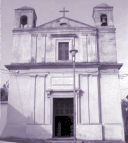
The Station is at the church of Sts. Cosmas and Damian, physicians. These martyrs were twin brothers originating from Arabia. They practiced medicine in Aegea, Cilicia, but accepted no money from the poor. Their beautiful Christian lives edified the pagans and converted many to the Faith. They were arrested in the persecution of Diocletian, subjected to torture, and finally beheaded.
Meditation on the Gospel - Mark 8:34-9:1
When Jesus said, "If any man would come after me...", he was well aware that in fulfilling his mission he would be brought to death on a cross; this is why he speaks clearly about his Passion (vv:31-32). The Christian life, lived as it should be lived, with all its demands, is also a cross which one has to carry, following Christ.
Jesus' words, which must have seemed extreme to His listeners, indicate the standard He requires His followers to live up to. He does not ask for short-lived enthusiasm or occasional dedication; He asks everyone to renounce himself, to take up his cross and follow him. For the goal He sets for men is eternal life. This whole Gospel passage has to do with man's eternal destiny. The present life should be evaluated in the light of this eternal life: life on earth is not definitive, but transitory and relative; it is a means to be used to achieve definitive life in heaven: "All that, which worries you for the moment, is of relative importance. What is of absolute importance is that you be happy, that you be saved" (J. Escriva, The Way, 297).
"There is a kind of fear around, a fear of the Cross, of our Lord's Cross. What has happened is that people have begun to regard as crosses all the unpleasant things that crop up in life, and they do not know how to take them as God's children should, with supernatural outlook. So much so, that they are even removing the roadside crosses set up by our forefathers...!
"In the Passion, the Cross ceased to be a symbol of punishment and became instead a sign of victory. The Cross is the emblem of the Redeemer: in quo est salus, vita et resurrectio nostra: there lies our salvation, our life and our resurrection" (J. Escriva, The Way of the Cross, II, 5).
Jesus promises eternal life to those who are willing to lose earthly life for his sake. He has given us example: he is the Good Shepherd who lays down his life for his sheep (Jn 10:15); and he fulfilled in his own case what he said to the Apostles on the night before he died: "Greater love has no man than this that a man lay down his life for his friends" (Jn 15:13).
Each person's eternal destiny will be decided by Jesus Christ. He is the Judge who will come to judge the living and the dead (Mt 16:27). The sentence will depend on how faithful each has been in keeping the Lord's commandments — to love God and to love one's neighbor, for God's sake. On that day Christ will not recognize as His disciple anyone who is ashamed to imitate Jesus' humility and example and follow the precepts of the Gospel for fear of displeasing the world or worldly people: he has failed to confess by his life the faith which he claims to hold. A Christian, then, should never be ashamed of the Gospel (Rom 1:16); he should never let himself be drawn away by the worldliness around him; rather he should exercise a decisive influence on his environment, counting on the help of God's grace. The first Christians changed the ancient pagan world. God's arm has not grown shorter since their time (cf. Is 59:1). Cf. Mt 10:32-33 and note on same.
Excerpted from The Navarre Bible - St. Mark
Things to Do:
- If you wish to gain the courage to embrace the small crosses in your life with joy, pray the Stations of the Cross. This is an excellent practice that should not only be confined to Lent but ought to be prayed on Fridays throughout the year. An excellent version with beautiful meditations composed by Pope John Paul II is his Stations of the Cross at the Colosseum. Some recommended versions are: Eucharistic Stations of the Cross, and the more traditional Stations of the Cross written by Saint Alphonsus Liguori can be found in most Catholic bookstores. Here are some guidelines for praying the Stations of the Cross in your home.
St. Hilary
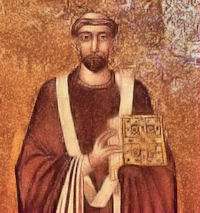 To replace a man like Leo was not easy, but the next pope was a man after Leo's heart, the archdeacon Hilary. Hilary was a Sardinian who had joined the Roman clergy and had been sent by St. Leo as one of the papal legates to the council at Ephesus in 449. This council, intended to settle the Monophysite affair, got out of hand. Packed with Monophysites and presided over by Dioscorus, the patriarch of Alexandria, the assembly refused to listen to the protests of the papal legates. Dioscorus steam-rollered through the council a condemnation of the orthodox and saintly Flavian, patriarch of Constantinople, and an approval of the Monophysite leader Eutyches. In vain Hilary protested. He had to fly in fear for his life and hide in a chapel of St. John the Evangelist. It was only with difficulty that he got back to Rome. No wonder St. Leo called this Ephesus council a gathering of robbers!
To replace a man like Leo was not easy, but the next pope was a man after Leo's heart, the archdeacon Hilary. Hilary was a Sardinian who had joined the Roman clergy and had been sent by St. Leo as one of the papal legates to the council at Ephesus in 449. This council, intended to settle the Monophysite affair, got out of hand. Packed with Monophysites and presided over by Dioscorus, the patriarch of Alexandria, the assembly refused to listen to the protests of the papal legates. Dioscorus steam-rollered through the council a condemnation of the orthodox and saintly Flavian, patriarch of Constantinople, and an approval of the Monophysite leader Eutyches. In vain Hilary protested. He had to fly in fear for his life and hide in a chapel of St. John the Evangelist. It was only with difficulty that he got back to Rome. No wonder St. Leo called this Ephesus council a gathering of robbers!
As pope, Hilary worked hard to foster order in the Gallic hierarchy. When a certain Hermes illegally made himself archbishop of Narbonne, two Gallic delegates came to Rome to appeal to Pope Hilary. He held a council at Rome in 462 to settle the matter. He also upheld the rights of the see of Arles to be the primatial see of Gaul. From Spain also came appeals of a similar nature. To settle these Hilary held a council at Rome in 465. This is the first Council at Rome whose acts have come down to us. According to the "Liber Pontificalis" he sent a letter to the East confirming the ecumenical councils of Nicaea, Ephesus, and Chalcedon, and the famous dogmatic letter of his predecessor St. Leo to Flavian. He also publicly in St. Peter's rebuked the shadow-emperor Anthemius for allowing a favorite of his to foster heresy in Rome.
St. Hilary deserves great credit for his work in building and decorating churches in Rome. Of especial interest is the oratory he built near the Lateran, dedicated to St. John the Evangelist. The Pope attributed his escape from the wild Monophysites at Ephesus to the intercession of the Beloved Disciple, and to show his gratitude he built this beautiful oratory. Over its doors may still be seen the inscription, "To his deliverer, Blessed John the Evangelist, Bishop Hilary, the Servant of Christ." Hilary built two more churches and spent freely in decorating still others. The gold and silver and marble used so lavishly by this Pope in adorning the Roman churches indicate that the wealthy families of Rome must have saved something from the grasping hands of Goths and Vandals.
St. Hilary died on February 29. His feast is celebrated on February 28.
—Excerpted from Defending the FaithHighlights and Things to Do:
- Read more about St. Hilary or Hilarus:
- St. Hilary's relics are buried in Basilica Papale di San Lorenzo fuori le mura (Papal Basilica of St. Laurence Outside the Walls.
Saint Romanus of Condat
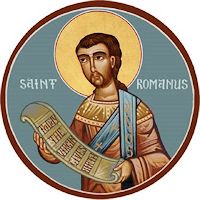 Romanus at thirty-five years of age left his relatives and spent some time in the monastery of Ainay at Lyons, at the great church at the conflux of the Saône and Rhone which the faithful had built over the ashes of the famous martyrs of that city; for their bodies being burned by the pagans, their ashes were thrown into the Rhone, but a great part of them was gathered by the Christians and deposited in this place.
Romanus at thirty-five years of age left his relatives and spent some time in the monastery of Ainay at Lyons, at the great church at the conflux of the Saône and Rhone which the faithful had built over the ashes of the famous martyrs of that city; for their bodies being burned by the pagans, their ashes were thrown into the Rhone, but a great part of them was gathered by the Christians and deposited in this place.
Romanus a short time after retired into the forests of Mount Jura, between France and Switzerland, and fixed his abode at a place called Condate, at the conflux of the rivers Bienne and Aliere, where he found a spot of ground fit for culture, and some trees which furnished him with a kind of wild fruit. Here he spent his time praying, reading, and laboring for his subsistence.
Lupicinus, his brother, came to him sometime after in company with others, who were followed by several more, drawn by the fame of the virtue and miracles of these two Saints. Their numbers increasing, they built several monasteries, and a nunnery called La Beaume, which no men were allowed ever to enter, and where St. Romanus chose his burial-place.
The brothers governed the monks jointly and in great harmony, though Lupicinus was the more inclined to severity of the two. Lupicinus used no other bed than a chair or a hard board; never touched wine, and would scarcely ever suffer a drop either of oil or milk to be poured on his pottage. In summer his subsistence for many years was only hard bread moistened in cold water so that he could eat it with a spoon. His tunic was made of various skins of beasts sewn together,. with a cowl; he used wooden shoes, and wore no stockings unless when he was obliged to go out of the monastery.
St. Romanus died about the year 460, and St. Lupicinus survived him almost twenty years.
Patronage: against insanity; against mental illness; drowning victims; mentally ill people
Highlights and Things to Do:
- Read more about St. Romanus of Condat:
- St. Romanus' relics are now in Abbey of Saint-Romain-de-Roche.
Bl. Daniel Brottier
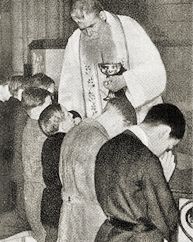 Blessed Daniel Brottier was a French Spiritan born in France in 1876 and ordained priest 1899. His zeal for spreading the Gospel beyond the classroom or the confines of France made him to join the Spiritan Congregation.
Blessed Daniel Brottier was a French Spiritan born in France in 1876 and ordained priest 1899. His zeal for spreading the Gospel beyond the classroom or the confines of France made him to join the Spiritan Congregation.
He was sent to Senegal, West Africa. After eight years there, his health suffered and he went back to France where he helped raise funds for the construction of a new cathedral in Senegal.
At the outbreak of World War I Daniel became a volunteer chaplain. He attributed his survival on the front lines to the intercession of Saint Therese of Lisieux, and built a chapel for her at Auteuil when she was canonized.
After the War he established a project for orphans and abandoned children "the Orphan Apprentices of Auteuil" in the suburb of Paris.
He gave up his soul to God on the 28th of February, 1936 and was beatified only 48 years later in 1984 by Pope John Paul II.
—Excerpted from Evangelizo.orgHighlights and Things to Do:
- Read more about Bl. Daniel Brottier:
- Read more about Brother Dan:
- Bl. Daniel was a member of the Congregation of the Holy Spirit which under his management took up the task of helping orphans after World War I.
- Bl. Daniel was buried at the Chapelle Sainte-Thérèse de la fondation d'Auteuil. In 1962 when his cause was being promoted, his remains were found to be completely intact.
- Bl. Daniel had great devotion to St. Thérèse the Little Flower.


